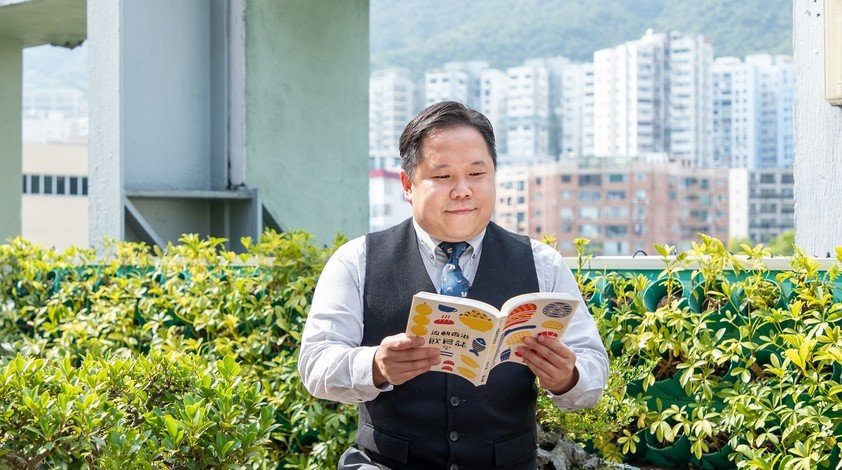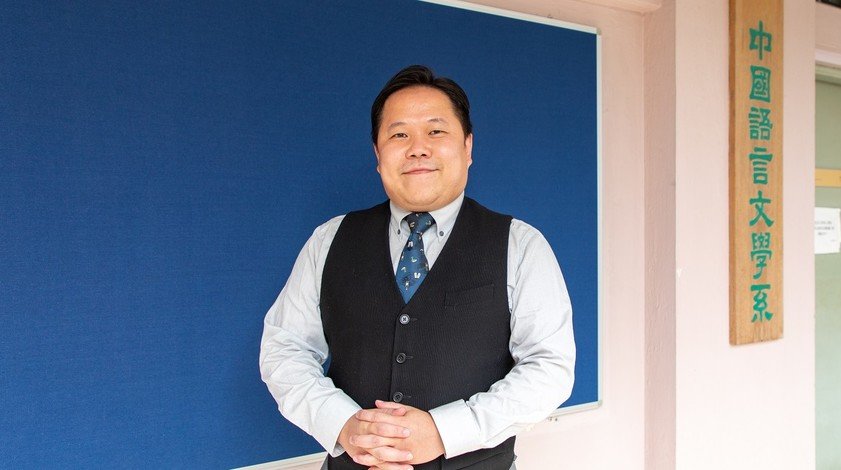discover hkbu
Understanding life through food
29 Oct 2021
Food plays an important and highly interesting role in our culture. Cha Chaan Teng (Hong Kong-style cafés), Dai Pai Dong (open-air food stalls), traditional Chinese restaurants as well as local sauces and specialities form part of the collective memory of many Hong Kong people, and they also represent Hong Kong's unique food culture. But how much do most people really know about the cultural origins of the dishes they eat every day?
Dr Siu Yan-ho, who joined the Department of Chinese Language and Literature earlier this year as a Lecturer I, believes that food culture is closely connected to a place's history, customs, society and culture, and therefore it is necessary to enhance people's understanding of the food culture of Hong Kong. "Some say that eating and drinking are a basic human need, just like breathing. However, a lot of people don't really care about it, and the same goes for food culture. I hope to nurture young people's knowledge of Hong Kong's food culture," he says.
From chef to university lecturer
Dr Siu has always been keen on Chinese culture and food culture. When he was a child, he enjoyed reading illustrated books on oracle bones. "I had a rather poor memory for text, and I found memorising pictures easier. Ancient texts are like pictures," he says, laughing. From these ancient tomes, he learnt about the culture, food and everyday life that existed at the time, and this piqued his interest in Chinese graphology.
Instead of pursuing further studies after the Hong Kong Certificate of Education Examination, he chose to follow his passion for food, and Dr Siu pursued a career in the food and beverage industry. Within a few years, he had progressed from being an apprentice to a chef in a French restaurant. When the outbreak of Severe Acute Respiratory Syndrome (SARS) significantly affected the industry, he realised the importance of knowledge and therefore decided to go back to school. After obtaining an associate and a bachelor’s degree, he continued his educational journey and successfully acquired his master’s and doctoral degrees.
"From the time I started my master's degree to my current role today as a university lecturer, I have always wanted to integrate my interest in Chinese culture, food culture and graphology into my teaching and research," says Dr Siu. His research focuses on Hong Kong's food culture and literature, and he seeks to understand the cultural dimensions of food, with studies that approach food culture from an academic perspective. "People usually take food-related knowledge lightly, and they think it contains a lot of hearsay information, but in rigorous academic research, we have to study food culture using a systematic and evidence-based approach," he says. As there is limited research data on Hong Kong's food culture, Dr Siu has to collect information from different media such as books, television programmes and newspapers, and he conducts analysis from the perspectives of food culture and literature as well as Chinese studies.
Using food culture to teach Chinese
Just as food culture is an intimate part of life, Dr Siu's research is also strongly connected to the community. At talks and workshops for primary and secondary schools, he often uses topics related to eating and drinking to teach students about the Chinese language, culture and history. "Students may find learning Chinese boring, but if we approach the subject from lighthearted topics such as food and everyday life, they can actually have fun while learning," he says.
Taking regional cuisine as an example, he points out that Chiuchow cuisine uses lots of seafood as the Chaoshan region is close to the sea. While the students may have heard of or eaten these dishes, they do not know the cultural background of the food, so this creates a good opportunity for teaching and learning. Furthermore, when teaching Chinese writing to non-Chinese speaking students, he encourages them to use their favourite food as the topic in sentence-writing exercises, so as to increase their interest in the subject. "We can promote food culture when teaching the Chinese language. At the same time, we can enhance the curriculum with the teaching of food culture and literature."
In recent years, Dr Siu has appeared on a number of television programmes, and he has acted in roles portraying different occupations and introduced various aspects of the Cantonese language and Chinese culture in a humorous way. His experience of performing has not only informed his teaching methods and enabled him to refine his communication skills, but it has also inspired him to use new media in class, which makes students' learning more effective. Besides writing newspaper articles and sharing his views in media interviews, he has also hosted public lectures to raise awareness of food culture.
Passing on knowledge and culture
With knowledge transfer close to his heart, Dr Siu always strives to translate his research on Hong Kong's food culture into knowledge that is useful for the community through various means, including service-learning programmes. He says that HKBU places a high value on service-learning, and he hopes to make use of his past experience of leading the service-learning programmes to enrich the learning journey of the students while also sharing his knowledge with the public.
He was recently awarded a grant of about HK$800,000 by the Standing Committee on Language Education and Research to launch a two-year multimedia project for primary and secondary students in Hong Kong. "This project will combine education, academic research and community service. Based on the themes related to eating and drinking, we will teach students creative writing in Chinese and the application of media in content creation. Students will also participate in voluntary services," he says enthusiastically.
Dr Siu also shares knowledge through his writing. Last year, he published a lighthearted book on the changing landscape of Hong Kong's food culture, drawing young readers' attention to local food and drink issues. Filled with interesting food stories, the book tackles topics ranging from food trucks and long queues for Michelin-starred restaurants to how a dish named "grouper fillet with sweet corn sauce" violated the Trade Descriptions Ordinance and the closing down of old-fashioned eateries.
This May, Dr Siu launched a new book recounting his experience of growing up in a public housing estate and the quintessential food options in the neighbourhood. In the book, he also expresses his views on the changes that have shaped Hong Kong's culinary scene. Some traditional restaurants, for example, were forced to close down as they couldn't find a family member to take over the business, and people flocked to pay a visit only after they had announced their closure. This certainly has had an impact on the local food culture. He says, "Hong Kong's food culture, as well as the city herself, are rapidly changing. I hope that through my publications we can document and preserve the shops, dishes, people and sentiments connected to Hong Kong's food culture."

